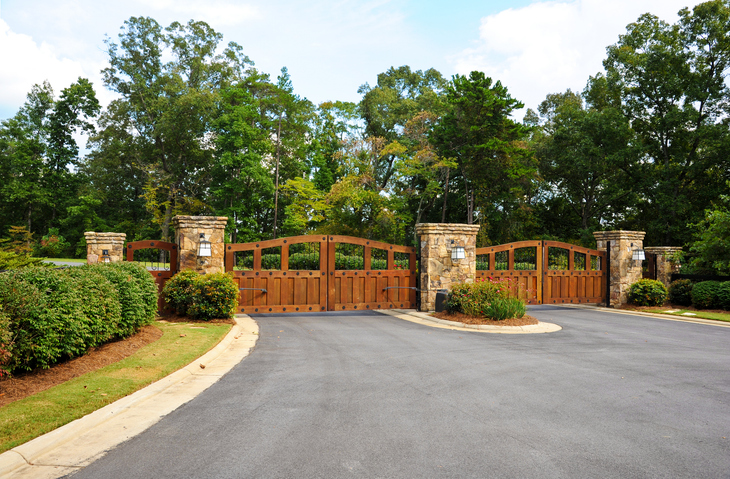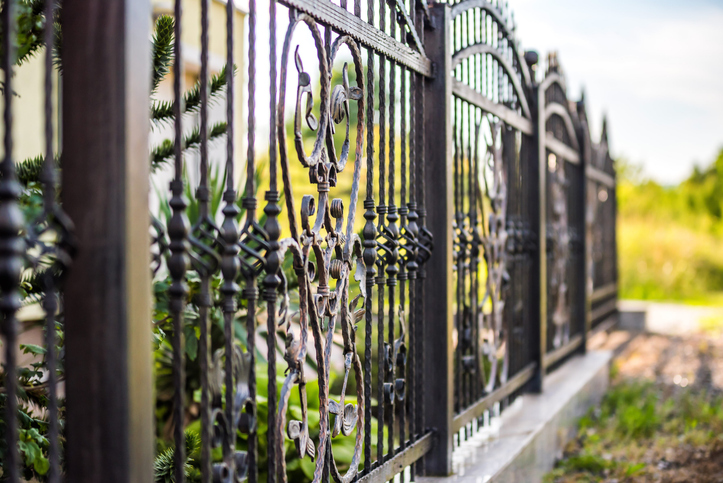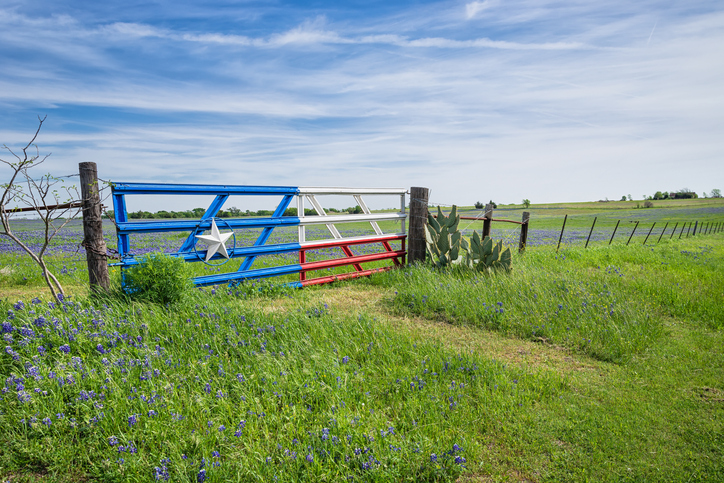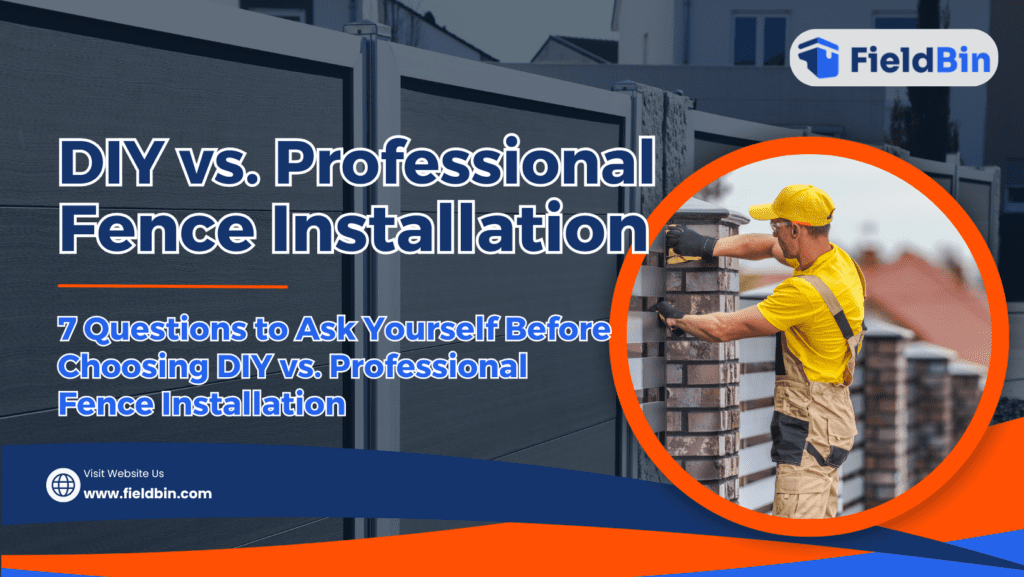Picture this: you’re relaxing in your backyard, enjoying the privacy and security of a beautiful new fence. It’s the dream, right? But before you get there, you face the classic DIY vs. professional fence installation dilemma: should you build the fence yourself or hire professionals?
When my family and I moved into our house, we had the same debate. The old fence was practically falling over, and we desperately needed more privacy. We were excited about a new fence, but choosing between DIY and hiring someone was tough. We wanted to save money on the fence installation cost, but the thought of all that work made us hesitate.
If you can relate, you’re not alone. The DIY route has a certain appeal – saving money is always a bonus. But let’s be real, building a sturdy and attractive fence isn’t always a walk in the park. You might be concerned about having enough time, the necessary skills, and whether the finished product will meet your expectations.
That’s why we created this guide. We’ve been there, and we want to help you navigate the DIY vs. professional fence installation decision. We’ll walk you through the key questions to consider, so you can confidently choose the best path for your situation. By the end, you’ll be ready to tackle your fence project with a clear plan, feeling good about the decision you’ve made for your home.

1. What Is Your Budget For The Fence Installation?
Let’s be honest, money is a major factor when considering a fence installation. DIY projects are tempting with the promise of saving some serious cash, but those savings can vanish if you’re not careful. Unexpected costs can pop up, and suddenly that DIY project isn’t so budget-friendly anymore. So, let’s get real about the costs involved in both DIY and professional fence installation to help you make a smart choice.
Material Costs: Picking the Perfect Pickets
- Fence Type: The type of fence you choose (wood, vinyl, metal, etc.) makes a big difference in your budget. When my family and I were choosing the right fence for our property, we fell in love with the look of wrought iron…until we saw the price tag! Each fence material has its own pros and cons – cost, upkeep, and how long it lasts. It’s about finding the best fence material comparison that works best for you.
- Fence Size: Think of it like ordering a pizza – the bigger the pie, the higher the price. The more space you need to fence in, the more materials you’ll need, and that means a bigger bill.
- Quality Matters: It’s easy to be tempted by the cheapest option, but trust me, I learned this the hard way with my first DIY deck project. Sometimes, spending a bit more upfront on quality materials can save you headaches (and money!) down the road on repairs and replacements.
Tool & Equipment Costs: Gearing Up For DIY or Pro Installation
- Essential Tools: If you’re going DIY, you’ll need the right tools. Post hole diggers, saws, levels, drills…the list goes on. And don’t forget safety gear!
- Buy or Rent: If you don’t already own these tools, you’ll need to decide whether to buy or rent them. Renting can be a lifesaver for those big, expensive tools you might only use once.
Hidden Costs: The Sneaky Expenses In Fence Installation
- Permits and Inspections: Depending on where you live, your local government might require permits and inspections. These can add unexpected costs to your project, so be sure to check!
- Disposal Fees: Getting rid of your old fence? Yep, that might cost you, too. We were surprised by the fees for hauling away our old wooden fence!
- Landscaping Repairs: Sometimes, installing a fence can leave your yard looking a bit rough. You might need to factor in the cost of fixing things up afterward, like replanting grass or shrubs.
Professional Installation Costs: Paying for Peace of Mind
- Labor Costs: When you hire professionals, you’re paying for their skills and time. The cost can vary based on how complicated your project is and the contractor’s rates.
- Expertise & Efficiency: Hiring professionals takes the stress out of the whole process. They handle finding materials, bringing the tools, and managing the installation. Plus, they’re experts, so they can usually get the job done faster and make sure it’s done right.
- Get Quotes: It’s always a good idea to get quotes from a few different reputable fence contractors. This way, you can compare prices and services and find the best fit for you.
Tip: Create a detailed budget spreadsheet! Include all potential costs, even sneaky ones. This will help you stay on track, compare DIY vs. professional fence installation costs, and make a decision that’s right for your wallet.

2. What Is Your Timeline For Completing The Fence?
Let’s be real – nobody wants a fence installation dragging on forever. Whether you’re doing it yourself or hiring professionals, it will take time. So, before you start, let’s have a heart-to-heart about the time commitment involved in each approach. We want to make sure your expectations are grounded in reality!
DIY Time Commitment: The Reality Check
Let’s be honest – DIY projects often take longer than we initially think. It’s easy to underestimate how much time you’ll actually need to learn new skills, gather materials, and deal with those unexpected hiccups along the way.
- Honest Assessment: Take a long, hard look at your calendar. How much time can you realistically dedicate to this project each day or week? Be honest with yourself – don’t set yourself up for disappointment.
- Factors to Consider: Your work, your family, and even your physical fitness all play a role in how much time you can devote to building the fence. And let’s not forget, DIY can be physically demanding. Digging post holes, lifting heavy materials… It’s a workout!
- Expect the Unexpected: Even the best-laid plans can go sideways. Build in some buffer time for unexpected delays, bad weather, or those inevitable “learning moments” that come with tackling a new project.
Professional Installation Timeline: The Fast Track
If you need that fence up in a hurry, professional installation might be the way to go.
- Estimated Timeline: When you’re getting quotes from contractors, ask them for a realistic timeline. Professionals usually have the experience and manpower to work efficiently and complete the job faster than DIYers.
- Factors to Consider: But even with pros, a few things can affect the timeline:
- Weather: Rain or extreme heat can bring things to a screeching halt.
- Material Availability: If you have your heart set on a custom or unique fence, it might take longer to get the materials.
- Project Complexity: The size and complexity of your fence design also matters. A simple fence will go up faster than an elaborate one.
Tip: If you’re on a tight timeline, professional installation might be the better option. However, if you have flexibility and enjoy DIY projects, taking your time and completing the installation in stages could be a viable alternative.

3. What Are Your DIY Skills And Experience Relevant To Fence Installation?
Let’s be real, building a fence isn’t like assembling furniture from a box. It’s a whole different ball game—it takes skill, know-how, and a willingness to get your hands dirty. So, before you even think about picking up that shovel, let’s have an honest chat about your DIY abilities. Are you really up for this?
Skills Required: It Takes More Than A Hammer For Fence Installation
Fence installation isn’t as straightforward as it might seem. It’s a multi-step project that calls for a variety of skills. Here’s the lowdown on what you’ll need:
- Measuring and Layout: Precision is your best friend here. You need accurate measurements and a well-thought-out layout to get a fence that’s straight and level. Think measuring tapes, levels, maybe even string lines. Trust me, it can be trickier than you’d expect. I remember my first fence attempt – my measurements were slightly off, and it threw the whole thing off!
- Digging and Setting Posts: This is where the real work starts, and it’s no walk in the park. Digging post holes takes some muscle and a lot of patience, especially if you hit rocks or tree roots. (My neighbor once spent an entire weekend wrestling with one of those!) Then there’s setting the posts – mixing and pouring concrete, making sure they’re perfectly vertical and aligned. It’s an art in itself.
- Cutting and Assembly: Depending on your fence material, you’ll be cutting and putting together different parts. This might involve using saws, drills, and other power tools. Safety first, folks! If you’re not comfortable with power tools, it’s definitely worth practicing on some scrap wood before you start on the actual fence.
- Problem-Solving: Unexpected challenges? Oh, they’re coming. You might hit a buried cable or discover uneven ground. Being able to adapt and find solutions on the fly is key to a successful DIY fence installation. I once had to change my entire fence line because I unearthed a hidden sprinkler pipe!
Learning Opportunities: Expanding Your DIY Toolkit
If you’re a bit rusty in some of these areas but are eager to learn, no worries! There are tons of resources available to help you pick up the skills you need:
- Online Tutorials and Videos: YouTube is packed with instructional videos on how to build a wooden fence or other types of fences.
- DIY Workshops: Many hardware stores offer workshops on various DIY skills, including fence installation. These hands-on experiences are a fantastic way to build your confidence and knowledge.
- Books and Guides: There are plenty of books and online guides with step-by-step instructions on fence installation. Take some time to do your research and get familiar with the process before you start.
Knowing Your Limits: When To Call In The Pros For Fence Installation
Be honest with yourself about your DIY skills and limitations.
- If you’re unsure about any part of the installation, it’s perfectly okay to get professional help for certain tasks or even the whole project.
Remember, a poorly installed fence can be a safety hazard and might even lower your property value. If you’re not confident you can do it right, it’s always better to leave it to the experts.
Tip: Watch instructional videos and read DIY guides to familiarize yourself with the process and gauge your comfort level before committing to the project.

4. What Is The Complexity Of Your Fence Project?
Not all fences are the same. Some are straightforward, perfect for a weekend DIY warrior. Others? Well, they’re more like an obstacle course. Let’s break down what can make your fence installation a breeze or a headache, so you can figure out if it’s a DIY-friendly project or one that’s better left to the professionals.
What Makes A Fence Installation Complex? Factors To Consider For DIY vs. Pro
- Fence Type: The type of fence you choose plays a huge role. A basic chain-link fence is relatively easy to install. But a fancy custom wood fence with all the bells and whistles? That’s a whole other ballgame. I remember helping a friend install one of those – beautiful, yes, but it took us weeks to finish!
- Terrain: Is your yard flat and even, or is it full of slopes and curves? Uneven ground can seriously complicate things, requiring extra planning, adjustments, and maybe even specialized tools. I once tried to install a fence on a sloping hill…let’s just say it was a learning experience.
- Property Size: Bigger property, longer fence line. That means more materials and more work. A small backyard fence might be perfect for a DIY project. But a massive property? You might want to leave that to the pros. Trust me, digging dozens of post holes by hand is nobody’s idea of a good time.
- Obstacles: Trees, rocks, existing structures, or underground utilities can all throw a wrench in your plans. Navigating obstacles adds time, complexity, and a whole lot of frustration to a DIY project. I’ll never forget the time I hit a buried cable while digging a post hole – not fun!
Simple vs. Complex: A Quick Comparison Of Fence Installations
Let’s paint a picture to help you see the difference:
Simple:
- Short, straight fence line
- Flat ground
- No major obstacles
- Standard fence materials, easy to find
- Basic design
Complex:
- Long, winding fence line
- Sloped or uneven ground
- Trees, rocks, or other things in the way
- Custom or hard-to-find fence materials
- Complex design with lots of details
Assessing Your Project: A Reality Check For DIY vs. Professional Fence Installation
Walk around your property and picture your dream fence. Now, be honest with yourself. What challenges do you see?
- Experience: Have you tackled similar projects before? If you’re a seasoned DIYer, you might be ready for this.
- Skills & Tools: Are you comfortable with the tools and techniques you’ll need? Be real about your skill level. How do you feel about using power tools, digging, and problem-solving on the fly?
- Time & Energy: Do you have the time and energy to put into this? Even simple fence installations can be time-consuming and tiring.
- Adaptability: Are you prepared for unexpected challenges? Because they will happen. Do you have the patience and flexibility to roll with the punches?
When In Doubt, Ask A Pro For Fence Installation Advice
If you’re on the fence (pun intended!) about the complexity of your project or your ability to handle it, reach out to a professional fence installer. They can assess your property, discuss your needs, and provide valuable insights into the best approach. Many contractors offer free estimates, giving you a clearer picture of the costs and timeline involved in professional installation.
Remember, there’s no shame in asking for help! Sometimes, the best way to ensure a successful outcome for your fence project is to let the pros handle it.
Tip: If you’re unsure about the complexity of your project, consult a professional fence installer for advice and a free estimate. They can assess your property and provide insights into the best approach.

5. How Much Time And Energy Are You Willing To Invest In The Fence Project?
Okay, let’s be upfront about this: installing a fence is hard work. It’s not just a leisurely weekend project. Whether you’re swinging a hammer or hauling bags of concrete, it’s physically demanding and requires a significant investment of your time and energy. Before I tackled my own fence, I had to take a long, hard look in the mirror and ask myself, “Am I really up for this?” You should too.
Physical Demands: Fence Installation Is A Workout!
Fence installation is a full-body workout, no gym membership required.
- Digging: Digging those post holes is no joke, especially if your soil is like rock (which, let’s face it, it can be sometimes). You’ll need strength, stamina, and a good shovel. Or, even better, a post hole digger! I remember trying to dig holes in my backyard during the dry season… let’s just say it wasn’t my finest moment.
- Heavy Lifting: Fence panels, posts, bags of concrete – this stuff is heavy. You’ll need to be able to lift and move it all safely. Maybe rope in a friend or family member to help. Trust me, your back will thank you.
- Outdoor Work: Get ready to spend hours outside, no matter the weather. The sun can be brutal, and those sudden rain showers can really mess up your plans. Sunscreen, a hat, water, rain gear – these are your new best friends.
Time Commitment: Fence Installation Isn’t A Quick Fix
DIY fence installation rarely happens overnight. It often takes way longer than we think, especially if you’re a beginner.
- Realistic Expectations: Be honest with yourself. How much time can you realistically dedicate to this? If you have a busy job, family, or other commitments, DIY might take weeks, even months.
- Weekend Warrior or Vacation Project? Are you willing to give up your evenings, weekends, or even vacation time to get this done?
- The Learning Curve: If you’re new to fence installation, remember there’s a learning curve. Factor in extra time for figuring things out. It’s always better to take it slow and do it right the first time than rush through and make mistakes.
Mental And Emotional Energy: The DIY Roller Coaster
DIY projects can be incredibly rewarding, but they can also be frustrating and tiring.
- Prepare for Challenges: Things don’t always go smoothly. Be prepared for unexpected obstacles, setbacks, and those moments when you just want to throw in the towel. You’ll need patience and perseverance to push through the tough times and get to the finish line.
- Celebrate the Wins: Don’t forget to celebrate your progress! DIY projects can be a source of pride and satisfaction.
- Know When to Ask for Help: If you’re feeling overwhelmed or frustrated, reach out to friends, family, or even a professional. There’s no shame in asking for help – it’s often the smartest thing to do.
The Bottom Line: Weighing DIY vs. Professional Fence Installation Effort
DIY fence installation demands a lot – time, energy, and mental toughness. If you’re up for the challenge and enjoy the process of building and creating, DIY can be a great experience. But if you’re short on time, energy, or patience, professional installation might be the less stressful path to your dream fence.
Tip: If you’re short on time, energy, or patience, professional installation might be the more stress-free option. However, if you enjoy the process and find DIY projects fulfilling, the effort can be worthwhile.

6. What Quality And Aesthetic Level Are You Looking For In Your Fence?
Your fence isn’t just a boundary; it’s an expression of your home’s personality. Whether you dream of a classic white picket fence, a sleek modern metal design, or something totally unique, the quality and appearance of your fence matter. Big time. So, let’s dig into how DIY and professional installation compare when it comes to getting that picture-perfect fence that’ll last for years to come.
DIY Quality: Can You Pull It Off?
With good planning, attention to detail, and quality materials, a DIY fence can absolutely look professional and stand the test of time. But let’s be honest, it’s not easy. It takes skill, precision, and a commitment to doing things right.
- Material Matters: The materials you choose are the foundation of your fence. Don’t skimp on them, even if it means adjusting your budget a bit. A well-built fence can last for ages, saving you money on repairs and replacements in the long run. I’ve seen firsthand how quickly a neighbor’s fence fell apart because they went with the cheapest wood they could find.
- Attention to Detail: It’s the little things that count. Properly measuring, leveling, and securing each piece of your fence is what makes it look good and last. Take your time, double-check everything, and don’t rush. I can’t tell you how many times I’ve had to redo a section because I rushed and didn’t get it level the first time!
- Skill and Technique: Fence installation has its own set of techniques for setting posts, attaching panels, and making sure it’s structurally sound. Do your research. Watch some tutorials. Practice if you need to.
Professional Quality: The Expertise Advantage In Fence Installation
Professional fence installers bring years of experience and know-how to the table. They understand the ins and outs of different fence materials, have the right tools, and have perfected their installation techniques.
- Built to Last: Professionals know how to build fences that can withstand any storm. They use proven methods and quality materials to ensure your fence stays strong and secure for years. It’s an investment in your property.
- Peace of Mind: Many professional fence installers offer warranties or guarantees on their work and materials, giving you that extra layer of security. It’s one less thing to worry about!
- Efficiency and Expertise: Professionals can get your fence installed quickly and efficiently, saving you valuable time and energy. They can also offer expert advice on materials, design, and placement to ensure your fence meets your needs and looks fantastic on your property. Sometimes, their experience and insights can lead to ideas you might not have thought of on your own.
Aesthetics: The Finishing Touches On Your Fence
Your fence should do more than just function; it should also add to the beauty of your home.
- Style and Design: Think about your home’s style and landscaping when choosing a fence design. A professional can help you pick a style that complements your property and creates a cohesive look.
- Finishing Touches: Little details like post caps, decorative accents, and a well-crafted gate can take your fence to the next level and give it some personality.
- Curb Appeal: A well-designed and professionally installed fence can boost your home’s curb appeal and might even increase its value. First impressions matter, after all.
The Bottom Line: DIY vs. Professional For Your Desired Fence Quality
Whether you choose DIY or professional fence installation, prioritize quality and aesthetics. A well-built and beautiful fence will give you the privacy and security you want, and it will make your home look amazing for years to come.
Tip: If you’re concerned about achieving a professional finish or maximizing your property’s value, consider hiring a professional installer. However, if you’re confident in your DIY skills and willing to invest the time and effort, you can create a beautiful and functional fence yourself.

7. Are There Any Local Regulations Or Permits Required For Fence Installation?
Okay, before you even think about digging those first holes or ordering materials, pump the brakes for a second. We need to talk about local rules and regulations. Seriously, ignoring these can lead to fines, delays, or even having to tear down your hard-earned work! Nobody wants that headache, right? So let’s tackle the less glamorous, but equally important, legal side of things.
Zoning And Building Codes: The Rulebook For Fence Installation
Your local government probably has a whole rulebook about fences. These rules could cover things like:
- Height Restrictions: How high can your fence be? There’s usually a limit, especially in the front yard. You don’t want to block your neighbors’ views and end up talking about the neighborhood (for all the wrong reasons).
- Placement: Where exactly can you put your fence on your property? This is often regulated, especially when it comes to property lines and how far back it needs to be from the street or sidewalks. Double-check this one to avoid awkward conversations with neighbors later.
- Materials: Some areas have restrictions on what your fence can be made of. This could be for aesthetic reasons (keeping the neighborhood looking nice), or for safety reasons.
- Setbacks: You might need to keep a certain distance between your fence and your property line or other structures. I know someone who had to move their entire fence because they didn’t realize there was a setback requirement! Talk about a frustrating (and expensive!) mistake.
Permits: The Official Go-Ahead For Your Fence
Depending on where you live and what kind of fence you’re building, you might need permits before you start. These permits make sure your fence is up to code and safe.
- It’s always best to check with your local building department or planning office. A quick call can save you a lot of trouble down the line. Trust me, I learned this the hard way when I tried to add a deck to my house without a permit!
HOA Restrictions: Playing By The Community Rules For Fence Installation
If you live in a neighborhood with a homeowners association (HOA), they might have their own set of rules about fences. These rules can cover everything from your fence style and color to materials and height.
- Check your HOA’s rules before starting your project. You don’t want to run into any conflicts or have to redo things later. A friend of mine had to repaint their entire fence because it didn’t match the HOA’s color guidelines. Ouch!
Professional Assistance: Navigating The Red Tape Of Fence Installation
One of the advantages of installing a privacy fence or any other type of fence with a professional fence installer is that they’re already familiar with all these local regulations.
- Guide you through the permit process, so you don’t have to stress about it.
- Make sure your fence follows all the rules, saving you potential headaches down the line.
- Help you avoid any legal issues that could pop up.
Remember: It’s always better to be safe than sorry. Take the time to research and understand the local rules that apply to your fence installation. If you have any questions, don’t hesitate to reach out to your local building department or a qualified fence contractor. They’re there to help!
Tip: Research local regulations early in your planning process to avoid delays or costly mistakes. If you’re unsure about any requirements, consult with your local building department or a professional fence installer.
Conclusion: Your Fence, Your Call – DIY vs. Professional Fence Installation
So, there you have it! The DIY vs. professional fence installation debate doesn’t have a one-size-fits-all answer. It all boils down to your unique situation – your budget, your time, your skills, and the kind of fence you’re dreaming of. We’ve covered the essential questions to ponder, from the nitty-gritty costs and regulations to the more personal aspects like how much time you have and how confident you feel about DIY.
Remember, there’s no shame in either choice. DIY can be incredibly rewarding, but it’s definitely not for everyone. If you’re up for the challenge and have the resources, go for it! Just make sure you do your research and are well-prepared. A friend of mine built his own fence – countless hours on YouTube, even practiced on a small section first. The end result was fantastic, and he saved a bundle.
But, if you’re short on time, skills, or just want a stress-free experience, professional fence installation is a great option. I’ve seen firsthand how quickly a professional crew can get the job done, leaving you to enjoy your new outdoor space without the hassle.
We’d love to hear from you! Have you tackled a DIY fence installation before? Any tips or lessons learned? Or maybe you’ve had a great experience with a professional? Share your stories in the comments below! Let’s help each other make the best decisions and create fences we can all be proud of.
And remember, whether you go the DIY route or hire a pro, regular fence maintenance is key to keeping your fence looking its best and lasting for years to come!

